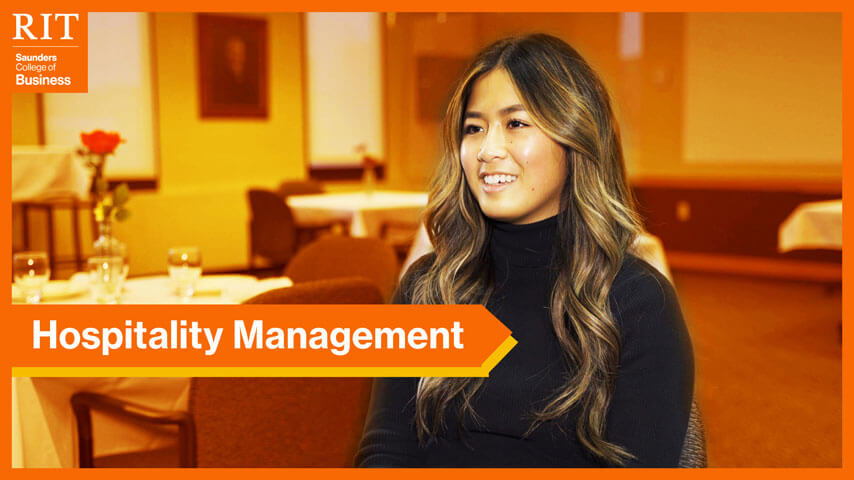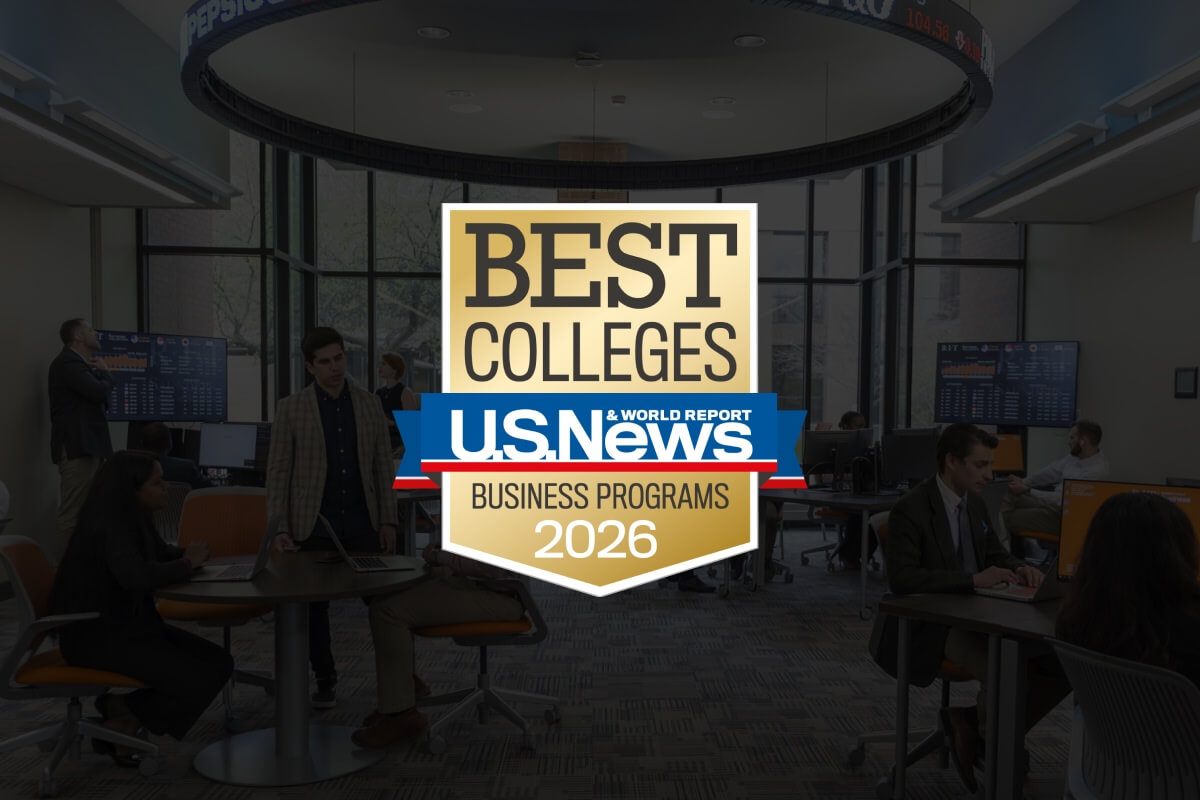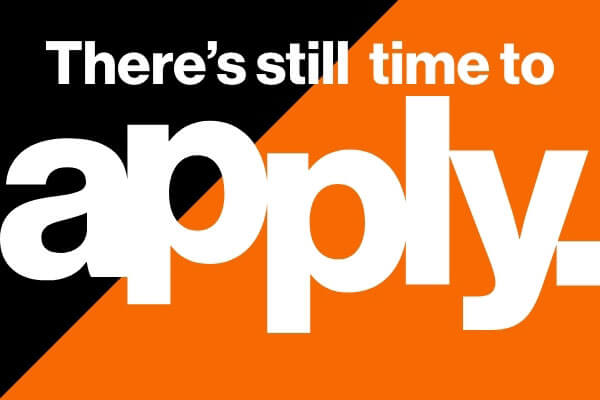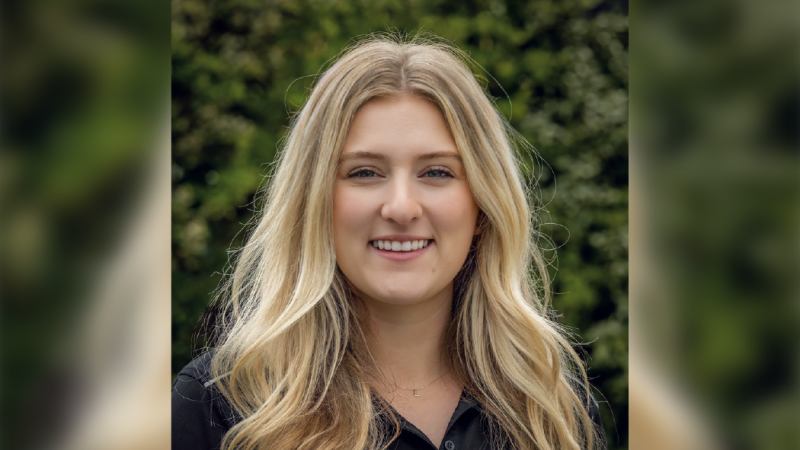Hospitality and Tourism Management Bachelor of Science Degree

Hospitality and Tourism Management
Bachelor of Science Degree
- RIT /
- Rochester Institute of Technology /
- Academics /
- Hospitality and Tourism Management BS
Deliver world-class service by mastering business, tech, and guest experience in hospitality and tourism.
Top 5
In New York State, Best Hospitality and Hotel Management Schools in the World
#59
Best Undergraduate Business Schools
Overview for Hospitality and Tourism Management BS
Why Study Hospitality and Tourism Management at RIT
Industry Exposure and Connections: Travel to multiple industry conferences, trade shows, and events. Network with top executives and stay abreast of industry trends.
Global Rotation Option: Through our global hospitality rotation, you can gain a global perspective on hospitality by spending a semester at RIT Croatia, located in Dubrovnik, one of the most prominent tourist destinations in the Mediterranean Sea.
Engage with Faculty: Learn in small classrooms from our faculty experts who infuse their industry experience and the latest research into their courses.
Make Alumni Connections: Access our vast network of successful alumni, who work in a range of exciting hospitality career fields.
Career Experience: Gain hands-on career experience through cooperative education and internships.
The hospitality and tourism degree provides an in-depth understanding of the hospitality and tourism industry and prepares you to enter any segment of the industry, including sports and entertainment management, hospitality real estate, beverage management, hotel/resort management, travel management, food marketing and distribution, cruise line operations, resorts and spas, event management, and airline catering. You will also find success in many other industries where delivering top innovative services and experiences is a priority.
Excellence in Hospitality and Tourism Management
Designing and delivering exceptional customer experiences requires innovative professionals with a deep understanding of business, technology, and service. Our hospitality management program is global in scope and innovative in focus. We prepare you to become a manager, hospitality professional, or entrepreneur who will thrive in their career.
The Saunders’ Hospitality and Tourism Student Experience
In Saunders, we ditch the large college auditoriums and embrace learning in small classrooms in order to create meaningful connections among students and faculty. You will get to know your classmates and professors while enjoying the scale, resources, and vibrant student life of a large college campus. At Saunders:
- Work hard/play hard: The rigor of a top-100 business program is met with opportunities to experience large events, enjoy fine dining, taste worldwide beverages, and visit world-class hotels.
- Engage in opportunities for networking and mentoring: You will have opportunities to visit premier hospitality events including the Americas Lodging Investment Summit (ALIS), The National Restaurant Show in Chicago, and the Hospitality Industry Technology Exposition and Conference (HITECH), to name a few.
- Industry meets Classroom: We host guest speakers form all aspects of the hospitality industry, including hotel general managers, corporate executives, restaurants and hotel owners; directors of sales, events, and catering; sports marketers; restaurant entrepreneurs; winemakers; and private club managers.
RIT’s Hospitality and Tourism Management Curriculum
RIT's hospitality and tourism management major includes a comprehensive core curriculum that provides you with a strong foundation in the core principles of hospitality, service management, and tourism operations. The hospitality management major gives you the opportunity to gain a wide set of skills which you can apply in any service industry. You may choose to specialize further though one of the hospitality minors:
- Beverage Management Minor: Develop the knowledge needed to engage in beverage sales, marketing, and distribution as you taste worldwide beverages. Course work in this minor prepares you for careers in areas such as beverage sales, distribution, and management in both hotels and fine dining restaurants; procurement/purchasing management; bar, lounge, winery, or brewery owner/manager/entrepreneur; sommelier; cicerone; or beverage brand marketing manager and/or distributor.
- Sports, Events, and Entertainment Management Minor: Delivery highly-effective experiences in the world of sports, events, and entertainment, and engage in careers as an sports/event venue sales manager; event manager for a hotel, sports venue, convention center, wedding venue, etc.; meeting planner for corporations, associations, or non-for-profit organizations; sports marketing manager; sports arena/facilities manager; private sports club manager; or sports analyst.
- Real Estate in Hospitality Minor: From idea to opening day, you'll learn the tools and techniques to develop properties and make hospitality investment concepts real. You'll be well-prepared for a real estate career as a real estate associate, consultant, financial analyst, development analyst, brand analyst, asset manager, or brand manager.
Technology and Hospitality: No Better Place than RIT
Among the biggest evolutions in the hospitality field is the impact of technology on the guest experience, food service and delivery, and more. Technology, along with data analytics, is driving how resorts, restaurants, theme parks, and cruise lines are interacting with guests and managing their expectations. From apps that help plan and manage guest experiences, to wearables that unlock guest room doors, to online check-in and food ordering, today’s hospitality professionals must be knowledgeable of how the latest technology is being used to improve the guest experience.
One of the most unique benefits of RIT’s hospitality and tourism management major is the collaboration between the program and RIT’s high-tech majors in computing and engineering. The latest innovations in hospitality – mobile reservations and check-in for hotels and flights, contactless ordering and restaurant kiosks, and more – are occurring at the interesting of these dynamic disciplines, and you have a front row seat to collaborating on the design and development of the next innovations in hospitality.
Hospitality and Tourism Management Study Abroad Programs
We develop global professionals for global careers. The hospitality and tourism management major offers numerous opportunities for both short- and long-term study abroad. Additionally, our curriculum prepares you for the challenges of operating in a global industry by developing your knowledge of cross-cultural customer interactions, languages, and business practices of multinational corporations.
Global Hospitality Rotation
The global hospitality rotation is an immersive experience where you will gain a global perspective in business and commerce by studying international business on two continents:
- RIT Croatia: You’ll spend the spring semester of your second year at RIT Croatia, studying in Dubrovnik. Known as the “Pearl of the Adriatic,” Dubrovnik is a medieval seaside port on the Adriatic Sea. It is a popular European cruise ship port that boasts many cafes, winding cobblestone streets, and old city neighborhoods. It also served as a main filming location for HBO's hit drama Game of Thrones.
- RIT: The majority of your course work will occur on RIT’s main campus in Rochester, N.Y. From its world-renowned attractions and historic museums to its phenomenal dining, world-class golf courses, and internationally recognized festivals, Rochester is a major metro city and a four-season adventure destination.
Study Abroad Opportunities
The BS in hospitality and tourism management is also offered at RIT Croatia, one of RIT’s global campuses. Located in Dubrovnik, Croatia, RIT Croatia is in the center of one of the most prominent tourist destinations in the Mediterranean Sea. In addition to the global hospitality rotation, you may also consider a:
- A 10-day study experience
- Semester-long study abroad experience
Both of these opportunities enable you to learn about the hospitality and tourism challenges and opportunities in Croatia as you study international hotel and resort management.
Furthering Your Education in Hospital and Tourism Management
RIT’s Combined Accelerated Bachelor’s/Master’s Degrees enable you to earn both a bachelor’s and a master’s degree in as little as five years, giving you a competitive advantage.
- +1 MBA Early Acceptance Pathway: Successful RIT applicants who are offered admission into the BS degree in hospitality and tourism management as an incoming first-year student may also be offered conditional early acceptance into the +1 MBA Early Acceptance Pathway. This option enables you to earn both your BS degree and an MBA in as little as five years of study. Learn how the +1 MBA Early Acceptance Pathway can help you add a competitive advantage to your studies.
- +1 MBA: Students who enroll in a qualifying undergraduate degree have the opportunity to add an MBA to their bachelor’s degree after their first year of study, depending on their program. Learn how the +1 MBA can accelerate your learning and position you for success.
Continue your studies at RIT with our MS degree in hospitality business management, where you can continue to advance your hospitality management skills with a master’s degree focused on cutting-edge analytics and technology skills, positioning you to pursue leadership positions. This master’s degree also enables you to develop a secondary focus in a range of areas, including finance, digital marketing, entrepreneurship, human resources, supply chain management, or data management.
-
#77 Best Business Undergraduate Programs, 2026
RIT’s business degrees are ranked among the Best Undergraduate Business Programs nationally.
-
Join Us for Accepted Student Open House
Visit campus on March 28 or April 11 to meet faculty, tour campus, and ask your questions.
-
Join us for Fall 2026
There's still time to apply. For some programs, applications will be reviewed on a rolling, space-available basis.
Careers and Experiential Learning
Typical Job Titles
| Asset Manager | Beverage Management (hotel or fine dining) | Brand Manager |
| Country Club Manager | Development Analyst | Event Manager |
| Meeting Planner | Purchasing Manager (bar, lounge, restaurant) | Sommelier |
| Sports Arena Manager | Sports Marketing Manager | Ticket Sales Manager |
| Hotel and Restaurant General Manager | Event Coordinator | Customer Service Specialist |
| Front Desk Manager | Catering Manager | Hotel Sales and Marketing |
| Hotel Real Estate Professional | Wine/Spirits Business Manager |
Industries
-
Food and Beverage
-
Hotels and Accommodation
-
Tourism
Cooperative Education
What’s different about an RIT education? It’s the career experience you gain by completing cooperative education and internships with top companies in every single industry. You’ll earn more than a degree. You’ll gain real-world career experience that sets you apart. It’s exposure–early and often–to a variety of professional work environments, career paths, and industries.
Co-ops take your knowledge and turn it into know-how. Business co-ops provide hands-on experience that enables you to apply your knowledge of business, management, finance, accounting, and related fields in professional settings. You'll make valuable connections between course work and real-world applications as you build a network of professional contacts.
Students in the hospitality management degree are required to complete a combined 1,200 hours of practical cooperative education experience with classroom theory. In co-op placements, students work directly in the hospitality industry in a variety of positions and organizations. Co-op is usually completed in the summer following the freshman and sophomore years and during any semester in the junior and senior years, except the final semester of the senior year, when students are required to be in residence on campus. Co-op is planned, monitored, and evaluated by the student, the co-op counselor, the faculty adviser, and the employing firm.
Careers in Hospitality and Tourism
Graduates of RIT's hospitality and tourism degree are prepared for outstanding career opportunities in a range of positions within hospitality and across all industries. Our alumni are employed at diverse firms such as Amazon, D3, Hello!, Hyatt Regency, Marriott, and more. Our Hospitality Advisory Board helps students prepare for their careers by ensuring the curriculum is continuously updated to meet employers needs while providing networking and mentorship opportunities.
Featured Work and Profiles
-
Rising Through Service: A Double Major Driving Excellence in Hospitality & Business
David Lanpher Monroe Golf Club | Pittsford, New York
Read More about Rising Through Service: A Double Major Driving Excellence in Hospitality & Business -
Research Insights: In the valley of the uncanny
Dan Jin Attraction to and fear of robots in the hospitality industry
Read More about Research Insights: In the valley of the uncanny -
Research Insights: Order takeout and save the planet
Muhammet Kesgin Encouraging customers to pay a premium for environment-friendly packaging
Read More about Research Insights: Order takeout and save the planet -
Hospitality Alum’s Journey from RIT to Casa Larga Winery
Tara Sarkin ’19 RIT/NTID alum Tara Sarkin (Beltrami), who attended SVP in 2013, earned her associate degree in 2016, and a bachelor’s degree in hospitality and service management in 2019, has always been...
Read More about Hospitality Alum’s Journey from RIT to Casa Larga Winery -
Hospitality Graduate Books Ticket to Prestigious Voyage Program
Samantha Phillips '25 ’25 Samantha Phillips '25 (hospitality and tourism management) was selected for Marriott’s prestigious Voyage Program, a launchpad for future leaders in hotel management.
Read More about Hospitality Graduate Books Ticket to Prestigious Voyage Program -
From Saunders Guided Growth to Event Success
Lauren Ehinger, co-op ’20 Parties A' La Carte | Largo, Florida, "RIT and Saunders College of Business have given me the confidence to be successful. All of my professors have been extremely dedicated to educating me...
Read More about From Saunders Guided Growth to Event Success
Curriculum for 2025-2026 for Hospitality and Tourism Management BS
Current Students: See Curriculum Requirements
Admissions and Financial Aid
First-Year Admission
First-year applicants are expected to demonstrate a strong academic background that includes:
- 4 years of English
- 3 years of social studies and/or history
- 3 years of math is required and must include algebra, geometry, and algebra 2/trigonometry. Pre-calculus is preferred.
- 2-3 years of science
Transfer Admission
Transfer applicants should meet these minimum degree-specific requirements:
- A minimum of college algebra is required. Pre-calculus or calculus is preferred.
Financial Aid and Scholarships
100% of all incoming first-year and transfer students receive aid.
RIT’s personalized and comprehensive financial aid program includes scholarships, grants, loans, and campus employment programs. When all these are put to work, your actual cost may be much lower than the published estimated cost of attendance.
Learn more about financial aid and scholarships
Accreditation
Related News
-
April 28, 2025

Hospitality graduate books ticket to Voyage program
Samantha Phillips, a graduating hospitality and tourism management major, has been selected for Marriott International’s prestigious Voyage Leadership Development Program, a fast-track career pathway designed to prepare high-potential college graduates for leadership roles in hotel operations and management.
-
April 7, 2025

CEOWORLD Magazine: 2025 Best Hospitality
Saunders College Hospitality and Tourism Management Program Ranked Highly by CEOWorld Magazine, 2025.
-
March 20, 2025

Saunders ranked #59 among best undergraduate business schools by Poets&Quants
Saunders College of Business’s undergraduate and graduate portfolio is nationally and internationally ranked and recognized. Most recently, Saunders was ranked #59 in the Poets&Quants list of best undergraduate business programs.
Contact
- Melissa Masline
- Assistant Director Student Services
- Student Services
- Saunders College of Business
- 585‑475‑6571
- menglish@saunders.rit.edu
Saunders College of Business























